
Hubbard Bowyer McDonald (March 4, 1850 - March 2, 1907) was chief clerk to the Secretary of the United States Senate and Parliamentarian of the United States Senate. [1]

Hubbard Bowyer McDonald (March 4, 1850 - March 2, 1907) was chief clerk to the Secretary of the United States Senate and Parliamentarian of the United States Senate. [1]
He was born on March 4, 1850, in Washington, D.C., to William J. McDonald and Ann Belle Holt. [1]
He died on March 2, 1907, of liver cancer at the Bachelor Apartment House in Washington, D.C. [1] [2]
Since California became a U.S. state in 1850, it has sent congressional delegations to the United States Senate and United States House of Representatives. Each state elects two senators to serve for six years, and members of the House to two-year terms.

Philander Chase Knox was an American lawyer, bank director and politician. A member of the Republican Party, Knox served in the Cabinet of three different presidents and represented Pennsylvania in the United States Senate.

Thomas Stanley Matthews, known as Stanley Matthews in adulthood, was an American attorney, soldier, judge and Republican senator from Ohio who became an associate justice of the United States Supreme Court, serving from May 1881 to his death in 1889. A progressive justice, he was the author of the landmark ruling in Yick Wo v. Hopkins.

John Hollis Bankhead was an American politician and Confederate Army soldier. A member of the Democratic Party, Bankhead served as U.S. Senator from the state of Alabama from 1907 until his death in 1920. Bankhead had additionally served in the United States House of Representatives, the Alabama Legislature, and as warden of the state penitentiary in Wetumpka.

The 32nd United States Congress was a meeting of the legislative branch of the United States federal government, consisting of the United States Senate and the United States House of Representatives. It met in Washington, D.C. from March 4, 1851, to March 4, 1853, during the last two years of Millard Fillmore's presidency. The apportionment of seats in the House of Representatives was based on the 1840 United States census. Both chambers had a Democratic majority.

The 31st United States Congress was a meeting of the legislative branch of the United States federal government, consisting of the United States Senate and the United States House of Representatives. It met in Washington, D.C., from March 4, 1849, to March 4, 1851, during the 16 months of the Zachary Taylor presidency and the first eight months of the administration of Millard Fillmore's. The apportionment of seats in this House of Representatives was based on the 1840 United States census. The Senate had a Democratic majority, while there was a Democratic plurality in the House.

The 1948 United States Senate elections were elections which coincided with the election of Democratic President Harry S. Truman for a full term. The 32 seats of Class 2 were contested in regular elections, and one special election was held to fill a vacancy. Truman had campaigned against an "obstructionist" Congress that had blocked many of his initiatives, and in addition the U.S. economy recovered from the postwar recession of 1946–1947 by election day. Thus Truman was rewarded with a Democratic gain of nine seats in the Senate, enough to give them control of the chamber. This was the last time until 2020 that Democrats flipped a chamber of Congress in a presidential election cycle.
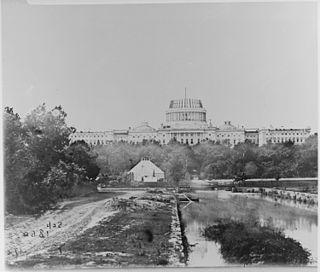
The 35th United States Congress was a meeting of the legislative branch of the United States federal government, consisting of the United States Senate and the United States House of Representatives. It met in Washington, D.C. from March 4, 1857, to March 4, 1859, during the first two years of James Buchanan's presidency. The apportionment of seats in the House of Representatives was based on the 1850 United States census. Both chambers had a Democratic majority.

The 33rd United States Congress was a meeting of the legislative branch of the United States federal government, consisting of the United States Senate and the United States House of Representatives. It met in Washington, D.C. from March 4, 1853, to March 4, 1855, during the first two years of Franklin Pierce's presidency. During this session, the Kansas–Nebraska Act was passed, an act that soon led to the creation of the Republican Party. The apportionment of seats in the House of Representatives was based on the 1850 United States census. Both chambers had a Democratic majority.

The 50th United States Congress was a meeting of the legislative branch of the United States federal government, consisting of the United States Senate and the United States House of Representatives. It met in Washington, D.C. from March 4, 1887, to March 4, 1889, during the third and fourth years of Grover Cleveland's first presidency. The president vetoed 212 pieces of legislation, the greatest number in a single session of Congress.

The 52nd United States Congress was a meeting of the legislative branch of the United States federal government, consisting of the United States Senate and the United States House of Representatives. It met in Washington, D.C., from March 4, 1891, to March 4, 1893, during the final two years of Benjamin Harrison's presidency.
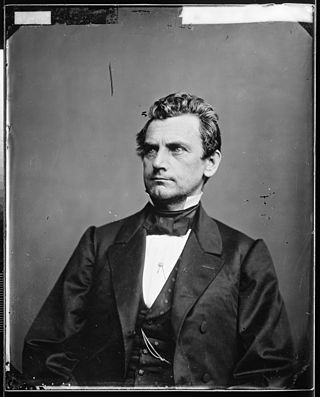
George Purnell Fisher was Attorney General of Delaware, Secretary of State of Delaware, a United States representative from Delaware and an Associate Justice of the Supreme Court of the District of Columbia, now the United States District Court for the District of Columbia.

The Bachelor Apartment House is an historic structure located in the Northwest Quadrant of Washington, D.C. The architectural firm of Wood, Donn & Deming designed the building.
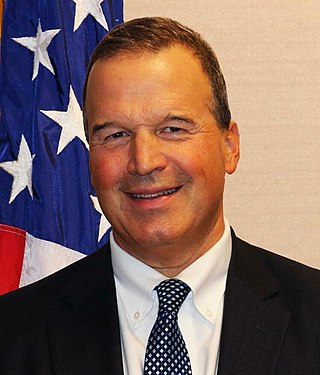
Luis Felipe Restrepo, known commonly as L. Felipe Restrepo, is a United States circuit judge of the United States Court of Appeals for the Third Circuit and former United States district judge of the United States District Court for the Eastern District of Pennsylvania. He is a member of the United States Sentencing Commission.

The 1972 United States Senate election in Oregon took place on November 7, 1972. Incumbent Republican Senator Mark Hatfield was re-elected to a second term in office, defeating Democrat Wayne Morse.

Allison Blair Jones Rushing is an American attorney and jurist serving as a United States circuit judge of the United States Court of Appeals for the Fourth Circuit since March 2019.
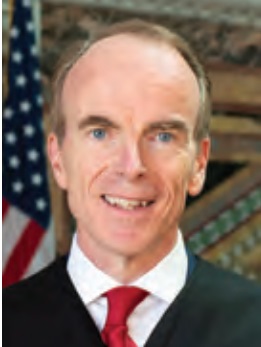
Daniel Paul Collins is a United States circuit judge of the United States Court of Appeals for the Ninth Circuit.
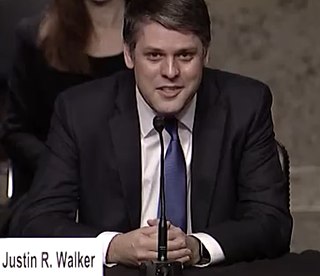
Justin Reed Walker is an American lawyer and jurist who serves as a United States circuit judge of the United States Court of Appeals for the District of Columbia Circuit. He was previously a United States district judge of the United States District Court for the Western District of Kentucky from 2019 to 2020.

The Thirty-Sixth Wisconsin Legislature convened from January 10, 1883, to April 4, 1883, in regular session.

The Forty-Fourth Wisconsin Legislature convened from January 11, 1899, to May 4, 1899, in regular session.